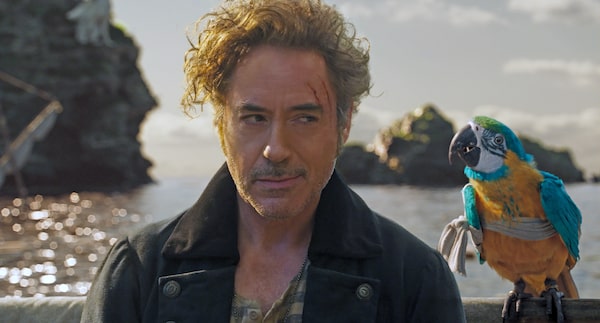
Robert Downey Jr. stars in director Stephen Gaghan's Dolittle.Universal Pictures
- Dolittle
- Directed by Stephen Gaghan
- Written by Stephen Gaghan, Dan Gregor and Doug Mand
- Starring Robert Downey Jr., Emma Thompson and Michael Sheen
- Classification PG
- 106 minutes
The English author Hugh Lofting planted the seeds of his Dr. Dolittle books while fighting in the trenches of the First World War. To distract himself from the horror of war, he wrote to his children with stories of a kindly physician who communicated with animals. It’s fitting, then, that Dolittle, a new film based on Lofting’s most enduring creation, is a kind of smokescreen for its own ostensible subject – the primal, enduring bond between animal and human. Pay no mind to the rapid destruction of the planet and the roughly one billion animals that have perished in Australia’s wildfires. Here’s a CGI ostrich that wears stockings.
Director Stephen Gaghan, who co-wrote the script with Dan Gregor and Doug Mand, returns the character to something approaching the books’ original setting of Victorian England. In a ramshackle cottage in the woods, Dr. Dolittle (Robert Downey Jr.) lives in cheerful squalor with a gaggle of wild creatures, including a nervous gorilla voiced by Rami Malek, a perpetually chilly polar bear (John Cena) and a sage parrot named Poly (Emma Thompson) who narrates the action – a necessity given the time-and-space-defying logic of the film’s plot. Tom Holland voices Jip, a dog whose primary trait is that he wears glasses.
Dolittle has been a recluse since his wife, Lily, a fellow adventurer, died in a shipwreck. In Downey’s first post-Marvel project after his role as Iron Man defibrillated his career in 2008, he essentially plays a bemused, brow-cocked version of himself – a mushy hybrid of Tony Stark and Captain Jack Sparrow, with an unintelligible accent (Welsh? Scottish?) to add to the confusion. He seems weary of his role even as he stumbles through it and is so often the only living being in his scenes that I found myself taking pleasure in picturing the actor hooting like an ape alone in a room, without the chorus of digitally rendered animals that rounds out the finished product.

Yoshi the polar bear and Chee-Chee the gorilla accompany Harry Collett's Tommy Stubbins on a journey to save Queen Victoria.Universal Pictures
Like Beauty and the Beast’s title brute, Dolittle finds his festering solitude interrupted by the appearance of a stranger – a sensitive boy named Tommy Stubbins (Harry Collett) who arrives with an injured yet feisty squirrel (Craig Robinson). Channelling Mrs. Potts, Poly urges the doctor, “You can’t ignore people just because they’re people.” Tell that to the industry that spawned both this film and Tom Hooper’s Cats – movies in which your eye is more likely to fall on “digital fur technology” than anything resembling a human being.
A royal emissary (Carmel Laniado) soon shows up to kick the plot into gear. The doctor’s presence is requested at Buckingham Palace, where Queen Victoria (a largely comatose Jessie Buckley) is deathly ill. The Queen, it turns out, has been poisoned, which prompts Dolittle, Tommy and a Noah’s ark of animals to set out on a journey by sea to find the antidote. On the way, they encounter Lily’s father, a pirate king played by the stalwart Antonio Banderas, and the evil Dr. Mudfly (a wonderfully committed Michael Sheen), a black-clad, goateed gadfly with selfish motivations to stop Dolittle and his band of zoological misfits.
The adventure unfolds in a near-literal blur of computer-generated action. Dolittle is about as far as you can get from the story’s previous iteration, the late-1990s Dr. Dolittle franchise starring Eddie Murphy. Those films augmented live animals with special effects and jettisoned the source material’s historical backdrop for a contemporary American setting. This approach offered a kind of clarity in its depiction of the bond between human and animal. In contrast, Dolittle is so maniacally torn between its central conceit and its tale of peril on the high seas that the animals are reduced to wisecracking helpmeets for the swashbuckling doc. There’s something outrageous, at this particular moment in time, about a fantasy wherein animals eagerly and unquestionably assemble to help save the lives of people.
Equally grotesque is the depiction of animals as essentially human in spirit. When Chee-Chee the gorilla first opens the manor’s gates to find Tommy, he doesn’t bellow like an ape but screams like a man. I found myself recoiling at the sound of that shriek and at the film’s callous projection of human emotions, fears and facial expressions onto species whose habitats we’ve been steadily destroying since Lofting first put pen to paper. Sure, this is a movie for kids, but children can – and should – understand the absurdity of a polar bear who’s always too cold.
It’s a deeply upsetting irony that as animation technology becomes more photo-realistic, the creatures it conjures become more imperilled. Maybe it’s appropriate, in a profoundly depressing way, to present children with this artificial fantasy of nature and its inhabitants; it’s increasingly the only version they’re likely to see. If the muddled plot and aesthetic chaos of Dolittle leaves a bitter taste in your mouth, seek the antidote – an episode of Planet Earth.
Opens Jan. 17.